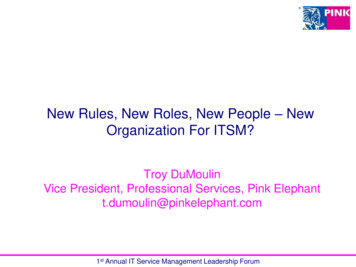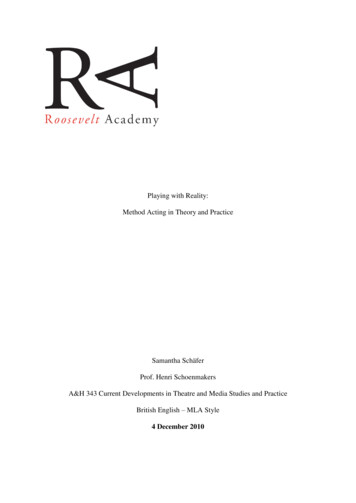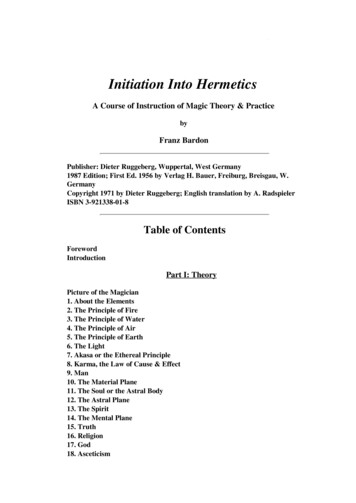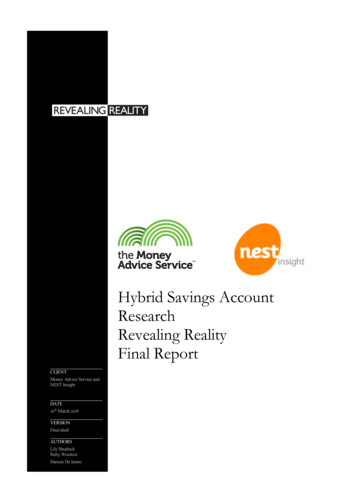
Transcription
The Future of RetirementA new realitySingapore Report
Contents3Foreword by HSBC4Introduction5Key findings6Part One: Getting the retirementyou wantyy Retirement hopes and fearsyy How much money will be needed inretirement and where will it come from?9yy Short-termism in savings behaviour17With a constantly evolving economy anduncertainties in life, it is difficult to predict whatis in store for the future. It is critical that oneis financially prepared to face these challengesand demands. At HSBC, our purpose is to provideholistic wealth solutions that will help customersface these evolving needs with confidence.Part Two: The obstacles to savingyy Why are people not saving for retirement?12ForewordWe are therefore delighted to introduce the latest in HSBC’s seriesof independent global studies into The Future of Retirement. A new realityis our eighth report and highlights the real challenges in planning for andPart Three: The role of savingand planningachieving the retirement you want.yy When do retirement savingand planning beginThis report reveals that saving for retirement is a challenge that mostyy The drivers of retirement savingand planningretirement filled with family and travel pursuits. However, over halfpeople face in Singapore. Most Singaporeans hope and aspire to a positiveof Singaporeans are inadequately prepared to lead a comfortable retirement life.yy How people make financial plansfor retirementNot having enough money to live on in later life, is the top fear thatyy The planning premiumis encouraging Singaporeans towards saving for retirement. Cash remainsPractical actions towards a morecomfortable futurea big part of Singaporeans’ wealth portfolio. The study found that cashsavings and deposits constitute a third of retirement income, followedby investments (including endowments), and property income and assets.Singaporeans clearly identify the benefits of financial planning and saving more,as the report shows that people who have a financial plan, particularly if theyalso take professional advice, on average will have more money in retirementthan those who do not. The reason is simple – they save more and they savefor longer – where globally, people saving on a regular basis amass more thandouble the retirement savings of those who save only from time to time.With life expectancy still on the increase, the need to save and plan for yourretirement is becoming ever more critical. Retirement is one of the fivecustomer needs all of our financial advisors discuss with our customers,and we hope the insights will encourage everyone to consider theirretirement planning carefully, and to start as early as possible. Take thisopportunity to review your financial plan today with our wealth planners.Paul ArrowsmithWalter de OudeHead of Retail Banking and WealthChief Executive OfficerManagement, HSBC SingaporeHSBC Insurance (Singapore)3
Part TwoThe obstacles to savingIntroductionHSBC’s The Future of Retirement programme is a worldleading independent study into global retirement trends.It provides authoritative insights into the key issuesassociated with ageing populations and increasinglife expectancy around the world.The 2013 global report, A new reality,part explores savings behavioursis the eighth in the series and isand what factors encourage andbased on a survey of more thandiscourage saving. The third part15,000 people in 15 countries infocuses on how people are currentlyJuly & August 2012. A further reportsaving and planning for retirement,looking at how people are living inand whether they are doing enough.retirement will be published later inThe final part lists some practicalthe year.actions that people can take toimprove their financial well-being inThis country report, based on thelater life.views of over 1,000 respondentsin Singapore, highlights our mainThe global report, other countryfindings into what people are lookingreports and all previous reportsforward to from their retirementare available on www.hsbc.com/and how they are expecting toretirementpay for these aspirations. The firstpart highlights people’s hopes andfears for retirement. The secondFamily and travel arethe most importantaspirations for retirement4Key findings Over half of Singaporerespondents feel their financialpreparations for a comfortableretirement are inadequate: 44%feel their preparations are notenough, whilst 12% are notpreparing at all. People run the risk of livinglong beyond their retirementsavings: on average, Singaporerespondents expect theirretirement to last for seventeenyears, but their retirementsavings to last for just nineyears. Cash savings are an importantsource of retirement funding inSingapore: 69% expect to usethis source, and on average,cash savings is expected torepresent 34% of retirementincome. Respondents understand theimportance of preparing forretirement from early on in life:on average, they see the ageof 34 as the latest by whichpeople can start planningfinancially and still expect tomaintain their standard of livingin retirement. When asked to choose betweensaving for the short termgoal of a holiday and for thelonger term goal of retirement,over half (54%) of Singaporerespondents chose to save forretirement while only 40% chosea holiday, showing they aremore focused on the long termthan the global average. In Singapore, there is a strongrelationship between financialplanning and saving more, withnearly half of respondents (45%)saying financial planning led toincreased saving for retirement,and only 31% saing they did notsave more. Fear is an important incentiveto saving in Singapore: 61%are motivated to save towardsretirement by the fear of nothaving enough money to liveon in later life. Similarly, 54%of those planning for retirementwere prompted by the desirefor a good standard of livingin later life.5
Part OneGetting the retirementyou wantRetirement hopes and fearsTo understand retirement savingsaspirations are to spend moreneeds in Singapore, there is a needtime with friends and family (71%),to understand people’s aspirations forto take more holidays (63%).later life. The most popular retirementFigure 1: Spending time with friends and family and travelling are key retirement aspirationsQ: Many people have specific hopes and aspirations for their retirement. Which, if any, of the following are importantaspirations for you? (Base: All not fully retired)Respondents were also questionedthese findings suggest many arewill be less than two people agedabout their fears around retirement.rightly worried about the growing15-64 for every person over 65, soThe most common concerns wereproblem of paying for healthcarethis will be a crucial issue affectingpoor health (70%) and financialand long term care in retirement.millions of families.hardship (62%). Taken together,According to the UN, by 2050 there71%familySpending more time with friends andFrequent63%holidays47%extentContinuing to work to some44%Learning new skills/hobby43% sportTaking more exercise/playing more38% workCharity/voluntary36% travelExtensive30%Home improvements/gardeningStarting a28%business27%abroadLiving18% itemBuying a new car/other expensiveLearning a foreign16%language15%Further educationWriting8% a bookNone1%of theseDon’t1% knowHow much money will be needed in retirementand where will it come from?Respondents were asked how muchfor people to achieve their aspirationsto last. The findings reveal thatmoney they feel they will need toin later life, especially as 44% ofon average Singapore respondentslive comfortably, both now and inrespondents are not adequatelyexpect their retirement to last forretirement. Using these figures, itpreparing for retirement, and 12% areseventeen years, but their retirementcan be determined the proportion ofnot preparing at all.savings to last for an average‘working age’ income that SingaporeTo further reveal the inadequacy ofof just nine.respondents believe they need forcurrent savings levels, respondentsa comfortable retirement is 66%.were asked how long they expectedThis indicates how much savingsto live in retirement, but also howbehaviour will have to change in orderlong they expected their savingsFigure 2: Poor health and financial hardship are the biggest retirement fearsQ: Many people also have concerns or fears for their retirement. Which, if any, of the followingconcerns or fears do you have? (Base: All not fully retired)Poor healthFinancial hardshipNot having enough money for good healthcare provisionLoss of memoryLonelinessNot being able to workHaving to work for longer than I want toBoredom66%:Figure 3: Over half are notpreparing adequately or at allfor retirementQ: Overall, financially do you think5%8%12%that you are preparing adequatelyfor a comfortable retirement?(Base: All not fully retired)31%No, I am not preparing at allPeople need twothirds of currentincome to staycomfortablein retirementNot being able to realise my hopes and aspirationsThe move from ‘active’ to ‘passive’ retirementDiscriminationNone of theseDon’t knowNo, I am not preparingadequatelyYes, I am preparing about adequatelyYes, I am preparing more thanadequatelyDon’t know644%Financial hardshipand poor health are thebiggest retirement fears7
100Figure 4: The largestCash savings/depositsproportion of retirementincome will come from cash8034%28%22%34%36%34%29%35%savingsQ: Once you are fully retired,40each of the followingsources?25%25%18%17%19%retirement income do you(Base: All not fully retired)Property income and assets, e.g. renting out, equityrelease, ‘downsizing’, sale36%Personal pensions(s)60what proportion of yourexpect will be funded fromInvestments, e.g. bonds, endowments, shares, unittrusts, mutual funds31%16%12%15%2018%18%State pension(s)/benefits14%15% rs12%InheritanceFinancial support from family and/or friends11%Company pension(s)11%6%2%3%1%35-44 45-54years yearsThe obstacles to savingWhy are people not saving for retirement?12% 11%9%Part Two9%3%4%4%55-64yearsOn average, respondents say thatuse a variety of sources to provideshowing that over two thirds (69%)they will need a household incomethis income, but the biggest chunkare expecting to use cash savingsof SGD 60,400 per year to feelwill come from cash savings (34%).to help fund their retirement.comfortable in retirement. As FigureThis is consistent across age groups.4 shows, respondents expect toFigure 5 reinforces this point,Nearly three-fifths (58%) of Singaporeare being held back by the costaverage, they see the age of 34respondents are regular savers: thisof day-to-day living, rising to 51%as the latest by which people canis higher than the global averageof 35-44 year olds. Nevertheless,start planning financially and stillderived from the fifteen countriesSingapore respondents understandexpect to maintain their standardsurveyed. Of those not savingthe importance of preparing forof living in retirement.for retirement, nearly half (47%)retirement from early on in life: onFigure 6: Nearly half say they cannot save for retirement due to the cost of day-to-day livingQ: Why have you never saved specifically for retirement? (Base: All not saved for retirement)All my money goes into living day-to-dayI’m saving/investing in a different wayI’ve never really thought about itRetirement is too FAR for me to start savingFigure 5: Over two thirds expect cash savings to contribute towards their retirement incomeThe economic climate has been too unstableQ: Thinking again about the way you envisage funding your own retirement, which of the following means do you think willcontribute towards your living in retirement?(Base: All not fully retired)My employer doesn’t/didn’t offer a pension schemeI don’t trust financial services companiesI don’t understand savings and investmentsI have other pension arrangements in placeMy partner’s pension/savings will provide sufficient incomeCash savings/depositaccounts69%47%My employer’s pension(s) are/were sufficient for my retirement54%42% Life insuranceRetirement is too CLOSE for me to start savingI have never worked full-time37%Stocks and shares30%The State will provide sufficient income36%Income from property ‘downsizing’/sale/rental23%Other 26%Long-term22% care insurance23%Mutual funds/unit trustsand investments19%22%Financial supportfrom my children18%17 921%Personalpension scheme13%20%Spouse/partner’sincome9%16%Defined contribution employer8%pension scheme16%8%vs.Annuities15%State pension/socialsecurity6%people expect to spend 17 years in retirement,but their savings to run out after 9 years15%Defined benefit empolyer4%pension scheme10%4%Inheritance9%4%Employer savings/sharescheme7%3%pension schemeOther employer6%3%Foreign currency6%2%Selling a business4%2% trusts/depositsOffshore23%12%Other savings/investmentproducts7%2%financial windfallOther1%2%7%13%8OtherDon’t know41%have never savedspecificallyfor retirement9
Figure 7 shows that there are someretirement preparation: 69% of thoseMoreover, about three-fifths (62%) oflife events that can derail people’saffected by at least one of the eventsthose whose retirement saving wasefforts to save for retirement. Thein Figure 7 said they saved less forever impacted by a life event claimmost important of these is theretirement as a result. In Singapore,they are still being affected by thecost of buying a home or paying athe most impactful life event affectsconsequences.mortgage (affecting 38%), followedpeople’s retirement savings behaviourby unemployment (29%). Life eventson average for just over three and acan have a damaging impact onhalf years, below the global average.Figure 8: Respondents in Singapore would rather save for retirement thanfor a holidayQ: If for one year you could only afford to save EITHER to go on holiday ORtowards your retirement, which would you be more likely to do? (Base: All not fullyretired)AllFranceUKUSAFigure 7: More than any other life event, buying a home has affected retirement savingsCanadaQ: Some people experience ‘life events’ which impact significantly on their ability to continue saving for their retirement.MexicoWhich, if any, of the following ‘life events’ have ever impacted significantly on your own ability to save for retirement?BrazilUAEEgypt(Base: All not fully retired)Hong KongIndiaMalaysia38% a mortgageBuying a home/payingChina29% unemployedBecomingTaiwan24%Paying for children’seducation23%StartingSingaporea familyAustraliaSignificant drop in 22%earnings/pay cut22%The recession/current economicdownturnIllness or accident preventing me/my22%spouse workingSave to go on holidaySave towards retirement19%Getting into debt/severe financialdifficulty15%Having to stop work to lookafter someoneHaving to fund/pay14%for a dependent13% partnershipGetting married/civilFigure 9: Over a third would use their retirement savings to deal with a crisis11%Paying for myown education10% StartingworkQ: Sometimes people experience unforeseen life events which can lead to serious5%Finishing full-timeeducationfinancial hardship. If you were to experience such hardship which, if any, of the5%Separation/divorce2%Remarrying5%Other eventfollowing actions would you be most likely to consider? (Base: All not fully retired)9%None of these events have significantlyimpacted5%Don’t know37%Use my other savings & investments24%Use my retirement savings & investments21%Use my insurance(s)Short-termism in savings behaviourAnother obstacle to retirement10average, with 40% choosing this19% homeMove into a smaller18%Look for better-paidworkthe readiness to draw on long-termsaving is the appeal of the short-option compared with 54% choosingsavings in an unexpected crisis willterm: immediate and perceivedto save for retirement (see Figure 8).act to reduce the value of retirementsavings needs are more tangibleNevertheless, a significant proportionsavings for some Singaporeand therefore may be given a higherof Singapore respondents are willingrespondents.priority than abstract and far-offto dig into retirement savings asgoals like retirement. Respondentsa means of dealing financially withwere asked to choose whether theyan unforeseen crisis. As Figure 9would save towards the short termshows, 35% would look to theirgoal of a holiday or the long termretirement savings to get throughgoal of retirement, if they could onlyserious financial hardship, thoughafford to save for one in a singlemore would use other savings (52%).year. Encouragingly, SingaporeTaken together, this shows thatrespondents were less likely towhilst focusing on the longer termchoose a holiday than the globalhelps to boost savings for retirement,Sell my18%valuables14% homeSell my main14%for helpAsk friends and family12%Sell my second home/otherproperty10% moneyBorrow (more)2% assetsSell my business/business6% actionOther12% knowDon’t38%say buying a homehas affected their abilityto save for retirement11
Part Three56%The role of savingand planningare not preparing adequatelyor at all for a comfortableretirementWhen do retirement savingand planning begin?The findings show that savingplanning for retirement starts, in(putting money aside for the future)Singapore the ‘gap’ is smaller, withand financial planning (evaluating thesaving beginning on average at 26,current situation, identifying futureand planning at 28. This figure hidesgoals and taking action to achievethe fact that 41% of Singaporethem) start at varying and differentrespondents have never savedages in the countries surveyed. Whiletowards retirement at all.on average worldwide retirementsaving starts four years beforeFigure 10: There is a smaller gap between starting to save and planningin SingaporeQ: At what age did you first start to save specifically for retirement? At what agedid you first start planning financially for retirement? (Base: All not fully retired,chart shows medians and excludes those who have not started saving or 28India29China28Hong l25UK61%Fear of not having enoughin to liveon in later life37%2630UAE30Indiaa home19%Advice from a 22%professional financialadviser30Hong Kong30Taiwan30work19%16%Running out oftime to planfor retirement15% partnershipGetting18% married/civilIt’s 15%what people do16%15%Government advice about the need to savefor retirement2813%27Australia18%Starting20%17% and familyAdvice from friends29ChinaMalaysia26%Buying25%of life is lower23% than I wantSeeing my retired parents’ standard of living/qualityEgyptSingapore28%Startinga family26%Paying15%off other debts11%low incomes14%in retirementNews stories about30Getting11%a promotion14%or pay increase10%14%mortgage offPaying theA period of13%illness or injury7%FinishingThe drivers of retirement saving and planning126%6%Figure 11 shows there are manyby far the most common motivator,(18%), getting married (15%)different reasons why people beginchosen by over three-fifths (61%)or paying off the mortgage (14%)to save for retirement, though fearof respondents. More positiveare far less important triggers.of financial hardship in later life isdevelopments such as starting ies6%The economyrecovering6%leaving homeChildren5%State pensioncutting the3%Qualifying for4%a company �t knowFigure 11: Fear of financial shortfallsin retirement is motivating savingQ: There are many reasons whypeople start saving for retirement.Which of the following are the mainreasons why you started or wouldstart saving for retirement?(Base: All respondents)13
Figure 12: The desire for a good standard of living in later life provides a spur to retirement planningFigure 13: Retirement planning is largely self-directedQ: What are the main reasons why you started planning financially for yo
retirement filled with family and travel pursuits. However, over half of Singaporeans are inadequately prepared to lead a comfortable retirement life. Not having enough money to live on in later life, is the top fear that is encouraging Singaporeans towards saving for retirement. C











